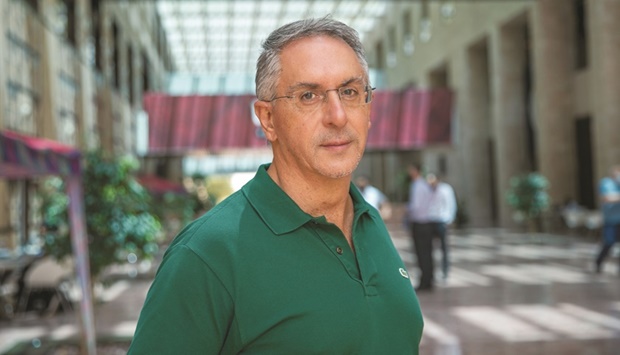* Grant from Qatar National Research Fund will help develop next-generation greenhouse technology
Carnegie Mellon University in Qatar (CMU-Q), a Qatar Foundation partner university, is launching a new research project that will optimize the operations of greenhouses in Qatar. The project is supported by a National Priorities Research Programme grant from Qatar National Research Fund (QNRF).
Lead principal investigator Gianni Di Caro is an associate teaching professor of computer science at CMU-Q. An expert in artificial intelligence (AI) and robotics, Di Caro will use machine learning (ML) to co-ordinate a fleet of mobile robots to autonomously gather visual data of Qatar greenhouse plants. The team will also employ AI and ML to build predictive models about the crop’s development status, quality, health and expected yield.
Di Caro said, “This research will empower the management of greenhouses with advanced tools so they precisely know what’s going on and what will happen in crop’s development.”
The robots will have RGB and multi-spectral cameras that will monitor each plant, and even each individual fruit, over time.
“By processing this visual data using AI, we can detect the presence of disease or pests, monitor plant development, and eventually optimise the conditions for growth and harvesting,” said Di Caro.
The project will face a number of challenges, including programming the robots to look around leaves or other occlusions to photograph the fruit on the plant, detecting and counting the fruits, and building predictive models for the development of the crop. The system will also generate large quantities of visual data. Di Caro and his team will use machine learning so the images will detect visual anomalies that indicate that a plant is not healthy.
CMU-Q will partner with researchers at three other institutions for this project: Ahmed Moustafa at the Al Sulaiteen Agricultural Research, Study and Training Center in Qatar; Klaas Dijkstra at NHL Stenden University of Applied Sciences in the Netherlands; and Antonio Ferrante at Universita Degli Studi di Milano.
Di Caro hopes this research will help Qatar further develop its agriculture sector, which has seen huge growth since 2017. “This project has many potential applications, from improving crop health to informing consumers about the origin and quality of the food they are buying,” he said.
We titled this project Greenhouse 5.0. If you think of 4.0 technology as a big step forward in innovation generation, this project is the step after that. We hope to integrate technologies, using artificial intelligence and automation together to make a real impact toward Qatar’s food sustainability.”
CMU-Q offers undergraduate programmes in biological sciences, business administration, computer science and information systems.
Lead principal investigator Gianni Di Caro is an associate teaching professor of computer science at CMU-Q. An expert in artificial intelligence (AI) and robotics, Di Caro will use machine learning (ML) to co-ordinate a fleet of mobile robots to autonomously gather visual data of Qatar greenhouse plants. The team will also employ AI and ML to build predictive models about the crop’s development status, quality, health and expected yield.
Di Caro said, “This research will empower the management of greenhouses with advanced tools so they precisely know what’s going on and what will happen in crop’s development.”
The robots will have RGB and multi-spectral cameras that will monitor each plant, and even each individual fruit, over time.
“By processing this visual data using AI, we can detect the presence of disease or pests, monitor plant development, and eventually optimise the conditions for growth and harvesting,” said Di Caro.
The project will face a number of challenges, including programming the robots to look around leaves or other occlusions to photograph the fruit on the plant, detecting and counting the fruits, and building predictive models for the development of the crop. The system will also generate large quantities of visual data. Di Caro and his team will use machine learning so the images will detect visual anomalies that indicate that a plant is not healthy.
CMU-Q will partner with researchers at three other institutions for this project: Ahmed Moustafa at the Al Sulaiteen Agricultural Research, Study and Training Center in Qatar; Klaas Dijkstra at NHL Stenden University of Applied Sciences in the Netherlands; and Antonio Ferrante at Universita Degli Studi di Milano.
Di Caro hopes this research will help Qatar further develop its agriculture sector, which has seen huge growth since 2017. “This project has many potential applications, from improving crop health to informing consumers about the origin and quality of the food they are buying,” he said.
We titled this project Greenhouse 5.0. If you think of 4.0 technology as a big step forward in innovation generation, this project is the step after that. We hope to integrate technologies, using artificial intelligence and automation together to make a real impact toward Qatar’s food sustainability.”
CMU-Q offers undergraduate programmes in biological sciences, business administration, computer science and information systems.

